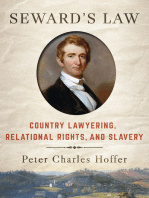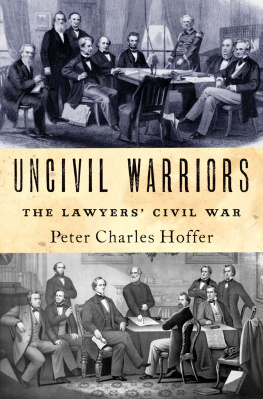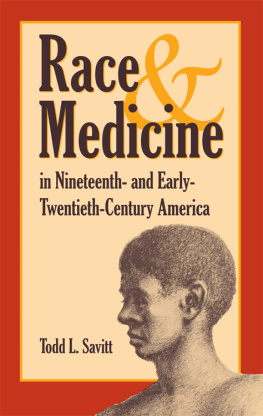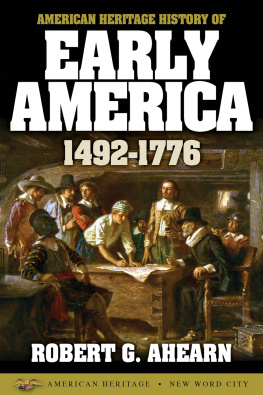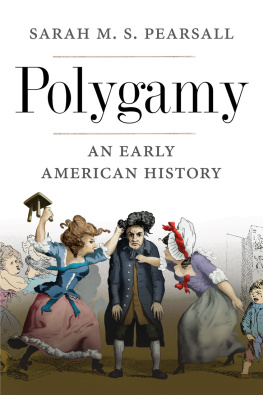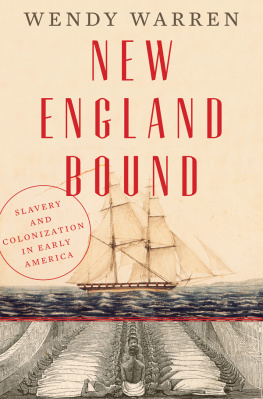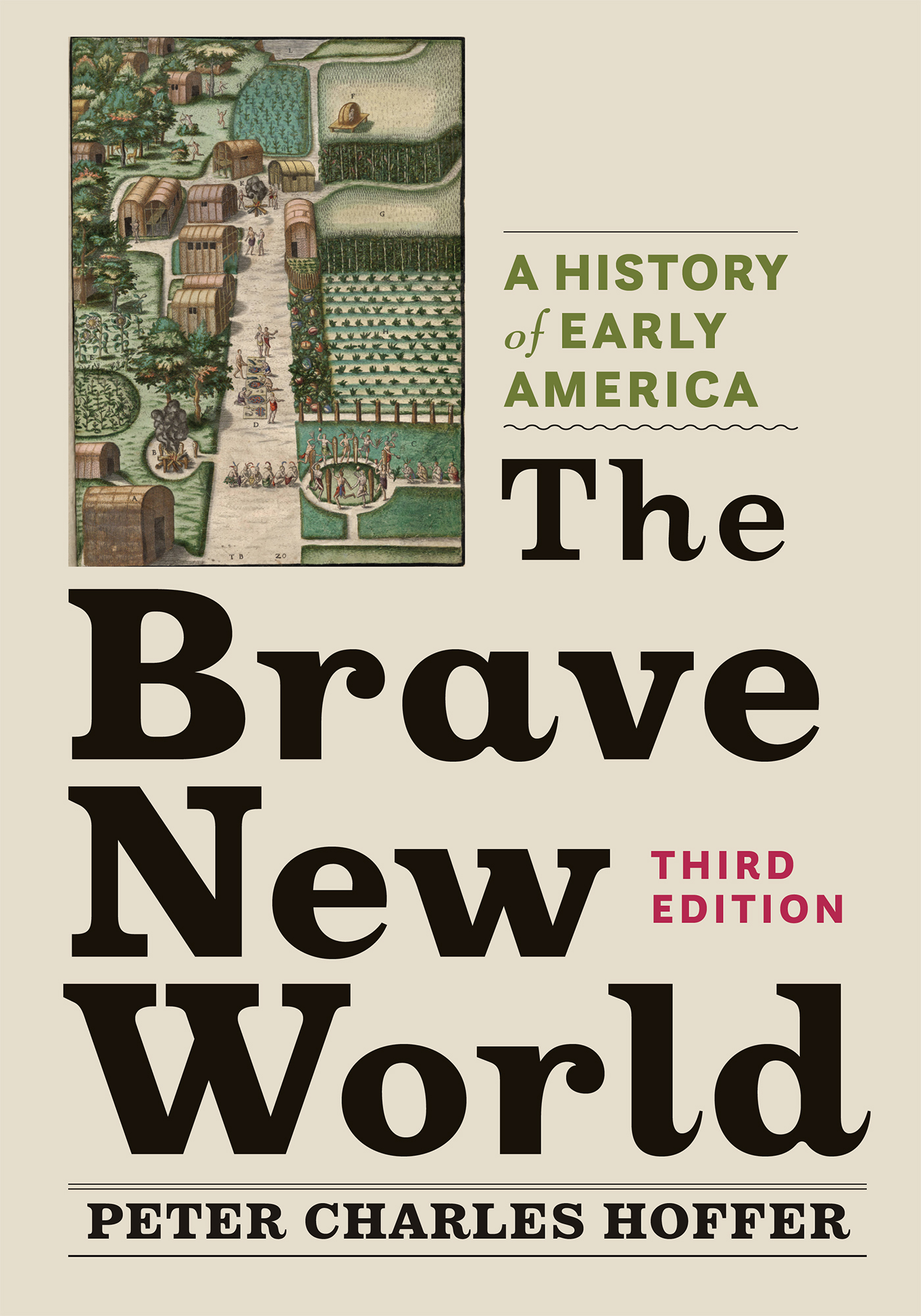Contents
Guide
The Brave New World
The Brave New World
A HISTORY OF EARLY AMERICA
Third Edition
PETER CHARLES HOFFER

JOHNS HOPKINS UNIVERSITY PRESS Baltimore
2000, 2006, 2023 Peter Charles Hoffer
All rights reserved. Published 2023
First edition published in 2000 by Houghton Mifflin Company
Printed in the United States of America on acid-free paper
9 8 7 6 5 4 3 2 1
Johns Hopkins University Press
2715 North Charles Street
Baltimore, Maryland 21218
www.press.jhu.edu
Library of Congress Cataloging-in-Publication Data
Names: Hoffer, Peter Charles, 1944 author.
Title: The brave new world : a history of early America / Peter Charles Hoffer.
Description: Third edition. | Baltimore : Johns Hopkins University Press, 2023. | Includes bibliographical references and index.
Identifiers: LCCN 2022007827 | ISBN 9781421445427 (paperback) | ISBN 9781421445434 (ebook)
Subjects: LCSH: United StatesHistoryColonial period, ca. 16001775. | Indians of North AmericaHistory. | AmericaDiscovery and exploration.
Classification: LCC E188 .H74 2023 | DDC 972.2dc23/eng/20220216
LC record available at https://lccn.loc.gov/2022007827
A catalog record for this book is available from the British Library.
Special discounts are available for bulk purchases of this book. For more information, please contact Special Sales at .
Preface to the First Edition
In 1994, a blue-ribbon panel of historians, teachers, and community leaders presented to K12 school boards across the nation the National History Standards. The standards were inclusive of all peoples who made America, their achievements and their conflicts. In short, it pulled no punches. One would have thought the seven-year effort would be widely welcomed. Not so. In the so-called culture wars of the day, the teaching of history had become a political issue. Every proposal was scanned for its supposed biases. Was it too critical of Americans? Was it too celebratory?
Early Americanist Gary Nash, the lead author of the National History Standards, had made his own position on them clear at the outset: The view that history is with the people is not only more fitting for a democratic society, in which it is assumed that an active citizenry is essential to the maintenance of liberty, it is more accurate. Nash gave this social history / many voices approach a pedigree: The peculiar disjunction of fabricating an elitist history for a democratic society has been challenged for at least a century by a long but thin line of historians connecting the contemporary scene with past generations.
Nash had correctly depicted the weight of opinion among the experts, but he had badly misguessed how more conservative observers would regard the whole project and the proposed standards. Lynne Cheney, who as director of the National Endowment for the Humanities had sponsored the collaboration of scholars and schoolteachers at the projects outset, condemned the final product. She found that the National History Standards reflected the gloomy, politically driven revisionism that had become all too familiar on college campuses. From its pages the heroes were all gone, according to Cheney, replaced by minor figures. Enduring values were gone too; only oppression remained. Speaker of the House Newt Gingrich agreed. Gingrich took aim at the professional historians: The fiasco over the American and Western history standards is a reflection of what has happened to the world of academic history. The profession and the American Historical Association are now dominated by younger historians with a familiar agenda: Take the West down a peg, romanticize the Other (non-whites), treat all cultures as equal, refrain from criticizing non-white cultures. The US Senate resolved its disapproval of the Standards ninety-nine to one.
Plainly, historians and teachers needed to take a long and sober look at the state of what we wanted students to learn. The very term colonial history was contested, for it seemed to suggest that the proper approach to our early history was from the east to west, traveling with Columbus and his crew of European mariners. Colonial history would then be the spread of European values, peoples, and technologies across what the Puritans had called a howling wilderness. What if, instead of following this relentless progress of civilization (as nineteenth-century American historians described our history) we shifted our perspective? What if, like Daniel Richter, we first tried an east-facing perspective: seeing our early history from Indian country? Then we might look south, to the world that the Indians and the Spanish newcomers made in the Caribbean and along the rim of the Gulf of Mexico. Then turn our eyes north, as the tendrils of French- and English-speaking societies planted themselves among the native peoples.
So one could move across the continent, seeing the terrain and the people with the eyes of those who lived our early history. It is a vast project, for the land was vast: two continents, girdled by two oceans. No one who lived on the continentsnot even the Carib Indians who fished the inland sea that would, when they were gone, gain their nameknew the full expanse of the waters or the land. Groping their way along the coastlines in their caravels, Europeans only gradually grasped the size of the domain they claimed for their respective monarchs. In a world where mapping is now done by Landsat from satellites, we may not credit the achievement of the Dutch and Portuguese mapmakers. They turned bits and pieces of often unverified observations into charts of a Brave New World.
Could such a diverse history have any unifying theme? It appeared to me that research findings in the field supported two quite distinct, in fact contradictory, points of view. One could say that over the long span of human occupation of the North American continent, there had been a spasmodic and uneven but undeniable improvement in the material standard of living and the degree of personal liberty. An old world of tradition, privilege, and rank gave way to a new society based on individual talent and desire. Overall, Richard D. Brown, the leading exponent of the modernization thesis, judged, American realities in economics, politics, religion, and social relationships delivered shattering blows to basic traditional structures. Jon Butlers Becoming America found in our founding period rapid economic transformation energetic provincial and local politics evolving secular and material culture rapidly expanding pluralistic religions vigorous subsocieties within the larger culture; and a widespread drive for authority to shape individual and collective destinies. As Jack P. Greene concluded in Pursuits of Happiness, In this situation, the achievement of peaceful enjoyment of personal independence, the objective that had initially drawn so many of both the first settlers and later immigrants to the colonies, continued to be the most visible and powerful imperative in the emerging American culture, the principal aspiration and animating drive in the lives of colonists of all regions.
At the same time, one could find overwhelming evidence that some people did not advance in this way, indeed, that their labor and sacrifice paid the price for others success, and that entire peoples and cultures were subordinated or forced to assimilate to other peoples. Under relentless pressure from the expansion of European populations, and weakened by epidemics of European diseases, Native Americans lost control of their ancestral territory. As Richard White movingly writes, by the end of the colonial era, the world of the eastern woodlands Indians had become a dreamscape of remembered forests and animals. Africans forcibly removed to the Americas as slaves struggled to maintain their dignity and regional identity against a brutal regime that homogenized all Africans as black and presumed that bondage fitted all blacks.


